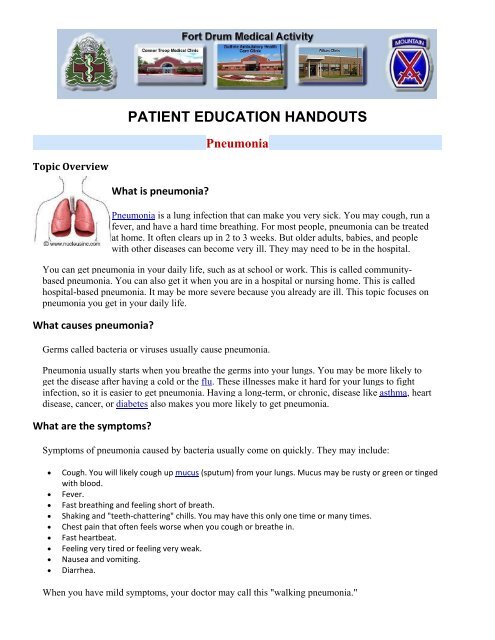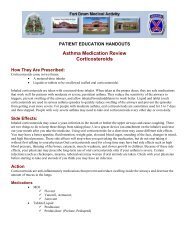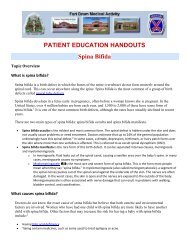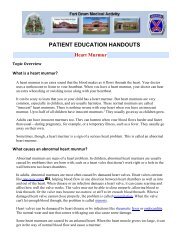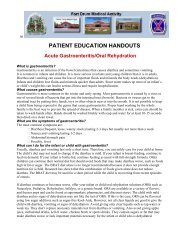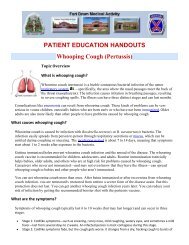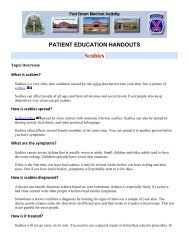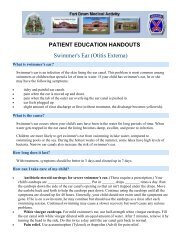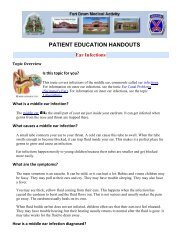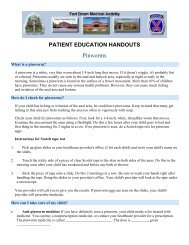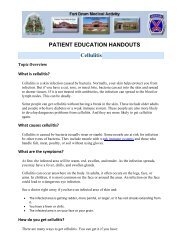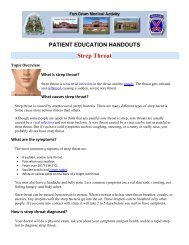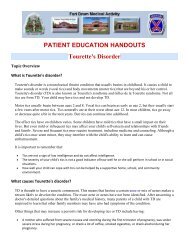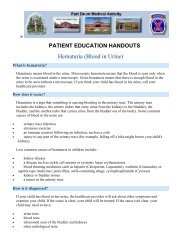PATIENT EDUCATION HANDOUTS Pneumonia
PATIENT EDUCATION HANDOUTS Pneumonia
PATIENT EDUCATION HANDOUTS Pneumonia
- No tags were found...
Create successful ePaper yourself
Turn your PDF publications into a flip-book with our unique Google optimized e-Paper software.
<strong>PATIENT</strong> <strong>EDUCATION</strong> <strong>HANDOUTS</strong><strong>Pneumonia</strong>Topic OverviewWhat is pneumonia?<strong>Pneumonia</strong> is a lung infection that can make you very sick. You may cough, run afever, and have a hard time breathing. For most people, pneumonia can be treatedat home. It often clears up in 2 to 3 weeks. But older adults, babies, and peoplewith other diseases can become very ill. They may need to be in the hospital.You can get pneumonia in your daily life, such as at school or work. This is called communitybasedpneumonia. You can also get it when you are in a hospital or nursing home. This is calledhospital-based pneumonia. It may be more severe because you already are ill. This topic focuses onpneumonia you get in your daily life.What causes pneumonia?Germs called bacteria or viruses usually cause pneumonia.<strong>Pneumonia</strong> usually starts when you breathe the germs into your lungs. You may be more likely toget the disease after having a cold or the flu. These illnesses make it hard for your lungs to fightinfection, so it is easier to get pneumonia. Having a long-term, or chronic, disease like asthma, heartdisease, cancer, or diabetes also makes you more likely to get pneumonia.What are the symptoms?Symptoms of pneumonia caused by bacteria usually come on quickly. They may include:• Cough. You will likely cough up mucus (sputum) from your lungs. Mucus may be rusty or green or tingedwith blood.• Fever.• Fast breathing and feeling short of breath.• Shaking and "teeth‐chattering" chills. You may have this only one time or many times.• Chest pain that often feels worse when you cough or breathe in.• Fast heartbeat.• Feeling very tired or feeling very weak.• Nausea and vomiting.• Diarrhea.When you have mild symptoms, your doctor may call this "walking pneumonia."
Older adults may have different, fewer, or milder symptoms. They may not have a fever. Or theymay have a cough but not bring up mucus. The main sign of pneumonia in older adults may be achange in how well they think. Confusion or delirium is common. Or, if they already have a lungdisease, that disease may get worse.Symptoms caused by viruses are the same as those caused by bacteria. But they may come onslowly and often are not as obvious or as bad.How is pneumonia diagnosed?Your doctor will ask you about your symptoms and do a physical exam. He or she may order achest X-ray and a blood test. This is usually enough for your doctor to know if you havepneumonia. You may need more tests if you have bad symptoms, are an older adult, or have otherhealth problems. In general, the sicker you are, the more tests you will have.Your doctor may also test mucus from your lungs to find out what germ is causing your pneumonia.Finding the exact germ can help your doctor choose the best medicine for you.How is it treated?Your doctor will give you medicines called antibiotics. These almost always cure pneumoniacaused by bacteria. You need to take all of your antibiotics so you get well. Do not stop taking thembecause you feel better. Take them exactly as your doctor tells you.<strong>Pneumonia</strong> can make you feel very sick. But after you take antibiotics, you should start to feelmuch better. Call your doctor if you do not start to feel better after 2 to 3 days of antibiotics. Callyour doctor right away if you feel worse.There are things you can do to feel better during your treatment. Get plenty of rest and sleep, anddrink lots of liquids. Do not smoke. If your cough keeps you awake at night, talk to your doctorabout using cough medicine.You may need to go to the hospital if you have bad symptoms, a weak immune system, or anotherserious illness.<strong>Pneumonia</strong> caused by a virus usually cannot be treated with antibiotics. Home treatment, such asrest and taking care of your cough, is the only treatment.How can you prevent pneumonia?If you are older than 65 or you have a heart or lung problem, you may want to get a pneumoniavaccine. It may not keep you from getting pneumonia. But if you do get pneumonia, you probablywill not be as sick.You can also lower your chances of getting pneumonia by staying away from people who have theflu, colds, measles, or chickenpox. You may get pneumonia after you have one of these illnesses.Frequently Asked QuestionsLearning about pneumonia:• What is pneumonia?• What causes pneumonia?• Can I prevent pneumonia?


